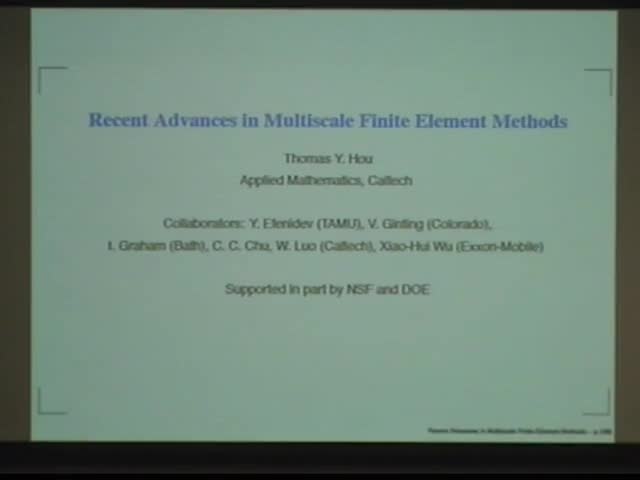Recent advances in mutliscale finite element methods
Presenter
October 31, 2010
Keywords:
- Multiple scale methods
MSC:
- 34E13
Abstract
A broad range of scientific and engineering problems involve multiple scales. Traditional approaches have been known to be valid for limited spatial and temporal scales. Multiple scales dominate simulation efforts wherever large disparities in spatial and temporal scales are encountered. Such disparities appear in virtually all areas of modern science and engineering, for example, composite materials, porous media, turbulent transport in high Reynolds number flows, and so on. Here, we review some recent advances in multiscale finite element methods (MsFEM) and their applications. The notion ``multiscale finite element methods'' refers to a number of methods, such as multiscale finite volume, mixed multiscale finite element method, and the like. The concept that unifies these methods is the coupling of oscillatory basis functions via various variational formulations. One of the main aspects of this coupling is the subgrid capturing errors. We attempt to capture the multiscale structure of the solution via localized basis functions. These basis functions contain essential multiscale information embedded in the solution and are coupled through a global formulation to provide a faithful approximation of the solution.
The lecture will start with some basic ideas behind MsFEM and its error analysis. We will put special emphasis on how to design appropriate boundary conditions for the local bases to minimize the subgrid capturing errors. In some cases, limited global information is required to capture the long range correlation among small scales. One way to achieve this is through an iterative precodure between the global large scale solution and the localized subgrid scale solution. We will also compare MsFEM with a few related multiscale methods. Applications to high contrast interface problems, two-phase flows in strongly heterogeneous porous media, uncertainty quantification, and domain decompositions will be discussed. Finally, we will present a new data-driven stochastic multiscale method for solving stochastic PDEs, which is in part inspired by MsFEM.
